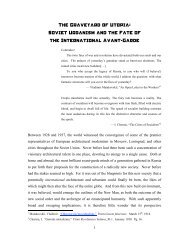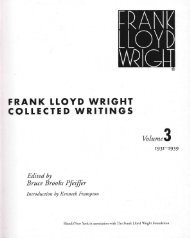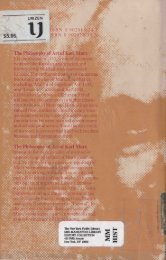MEMORIES OF THE FUTURE - The Charnel-House
MEMORIES OF THE FUTURE - The Charnel-House
MEMORIES OF THE FUTURE - The Charnel-House
You also want an ePaper? Increase the reach of your titles
YUMPU automatically turns print PDFs into web optimized ePapers that Google loves.
Of course, the “post-futuristic” world heralded by Berardi is only the latest in a longline of “posts” that have accumulated the last few decades. <strong>The</strong>se typically assume theform of prefixes appended to various nouns and adjectives. 15 Most of the time, though,the “transcendental signifier” undergirding all these terms (to use the parlance favored bythis discourse) is “postmodernism.” Unsurprisingly, it is Berardi himself who draws theconnection between postmodernism and the present age of post-futurism. He notes that1977, the date he associates with the death of the future, was also “the year that Jean-François Lyotard wrote <strong>The</strong> Postmodern Condition: A Report on Knowledge, in which heanalyzed the new organization of knowledge and the disappearance of the grand narrativeof progressive modernity.” 16 Despite the earnest efforts of those who, like Slavoj Žižek 17and Jason Schulman, 18 have recently come out “in defense of grand narratives” (even as“lost causes”), Bifo upholds Lyotard’s dictum of “incredulity toward metanarratives.” 19He thus rejects out of hand every attempt to construe history as the progressive unfoldingof human emancipation.Regrettably, the theoretical and practical framework that Berardi adopts in After theFuture proves far less interesting than his overarching claim that the future has ended.His theoretical exposition of the problem of post-futurist society is extravagant, jargonladen,and dense. 20 Berardi’s vague (if not outright baffling) gestures toward a practical15 To list just a few: post-ideology (Bell’s End of Ideology, 1962), “postindustrial” society (Bell’s Comingof Postindustrial Society, 1976), post-aesthetics (Danto’s “End of Art,” 1978), postmodernism (Lyotard’sPostmodern Condition, 1979), “post-political” politics (the Post-Political Politics of Negri, Guattari, Bifo,and Tronti, 1980), post-Marxism (“Post-Marxism without Apologies” by Laclau and Mouffe, 1987), posthistory/posthistoire(Fukuyama’s End of History, 1989), etc.16 Ibid., pgs. 47-48.17“‘Postmodernity’ as the ‘end of grand narratives’ is one of the names for [the] predicament [of a lost]universality.” Žižek, Slavoj. In Defense of Lost Causes. (Verso Books. New York, NY: 2008). Pg. 33.18 Schulman, Jason. “In Defense of Grand Narratives.” Jacobin. Spring 2011.19 Lyotard, Jean-François. <strong>The</strong> Postmodern Condition: A Report on Knowledge. Translated by GeoffBennington and Brian Massumi. (Manchester University Press. Manchester, England: 1984). Pg. xxiv.20 Berardi enthusiastically participates in the production and reproduction of concepts extolled by Deleuzeand Guattari — i.e., the creation and perpetuation of the outlandish neologisms so common in postmoderntheoretical discourse. Deleuze, Gilles and Guattari, Félix. What is Philosophy? Translated by GrahamBurchell and Hugh Tomlinson. (Columbia University Press. New York, NY: 1994). Pg. 159.7






